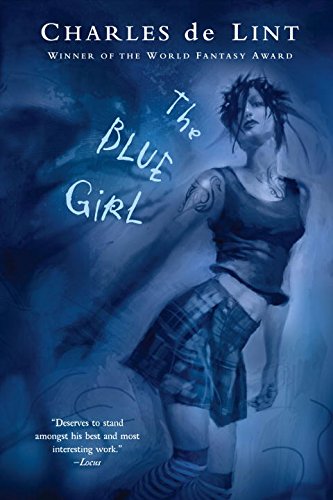
 The Blue Girl by Charles de Lint
The Blue Girl by Charles de Lint
What drew me to The Blue Girl wasn’t the bad girl trying to be a good girl premise. It wasn’t the thing about the resident student ghost or the gang of malicious fairies or being a social misfit. Been there, seen that — not just in books. It was the line about Imogene’s imaginary friend manifesting into reality that piqued my interest. Now that was something I couldn’t really recall seeing before. It tickled that whimsical part of me that my mom is so fond of talking about (and envying).
And there were some things about The Blue Girl that I liked, that I found fascinating. It’s one of those books where it’s a bit difficult to put into words exactly what it was I enjoyed; it’s more a feeling than actual things that I can point out and explain.
But the problem I had with The Blue Girl is something I can point out and explain. It’s what’s sometimes referred to as floating head dialog — meaning an extreme lack of dialog tags. I won’t get into the debate over whether this is good writing or bad or any of that, because that’s not the point. The reasons it’s a problem for me are, well, two of them are simple and one isn’t.
For starters, words for me have a sort of visual onomatopoeia — that is, instead of sounding how they mean, they look how they mean. It doesn’t take a lot of words to create a vivid image in my head, but if the words aren’t there I won’t necessarily get an image. The second problem with this type of dialog is if it goes on too long, I start losing track of who’s speaking. Then I have to pull myself out of the story and go back to figure it out. But the third problem is more complex. I’ve never tried explaining this before — in fact it’s only something I’ve just recently realized — so bear with me.
When I was 9 I was diagnosed with Aspergers Syndrome. AS is a high-functioning form of autism and, to keep this from getting overlong, I’ll simplify: the main issue AS causes is an inability or low ability to both understand and communicate tone of voice, facial expression, and body language. So what I’ve learned over the years is that when we talk to one another, we speak in four languages, not one. Each of these things — tone of voice, facial expression, body language — is its own language and just as important as the words that we say. More so, even. For me, the lack of dialog tags is like speaking to someone who doesn’t put out a lot of those signals — there’s nothing there for me to read and since I already struggle to, I get little to nothing at all. It saps all the emotion from a book, makes the tone of it dull and monotone. (And while I doubt that all AS people have this problem, I also doubt that not all non-AS people don’t have it.)
For about half the book, The Blue Girl was interesting enough that I was dealing with this. There were some sort of stop-again-start-again places along the way, but nothing the story couldn’t distract me from. And then, well… every single character in the story that encounters the strange and paranormal goings on is fazed by them for no more than an hour, tops. More often than not the characters already know all about it and aren’t the least bit surprised. And this…this I just don’t believe. If my imaginary friend sat down at the dinner table you can bet that my family would do more than shrug it off — and my imaginary friends were generally at least human. I just don’t believe any of it. My credulity no longer stretched far enough to really get absorbed into the tale. It started to feel overlong, like it would never end. And that’s unfortunate, because I was really enjoying it.
It’s not really a matter of good or bad, exactly. It simply didn’t work for me.


I picked my copy up last week and I can't wait to finish my current book and get started! I…
Gentlemen, I concur! (Forgive me for jumping into your convo)
The cover is amazing. I love how the graphic novel (and the review!) hewed close to the theme of "good…
I've thought about picking that one up. The artwork looks perfect.
I like the way you think, Bill. I found the second one particularly objectionable; the one with Khan. It was…